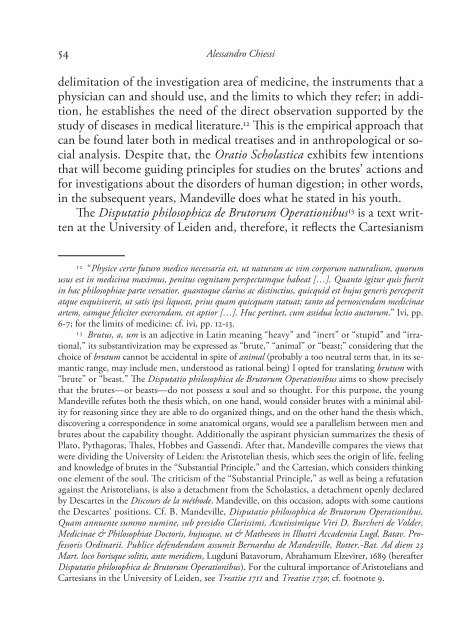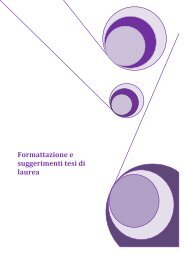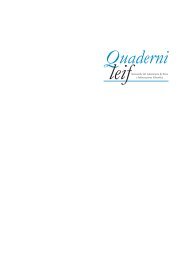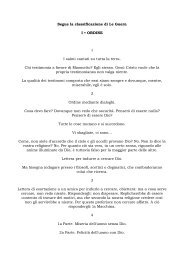qui - maria vita romeo
qui - maria vita romeo
qui - maria vita romeo
Create successful ePaper yourself
Turn your PDF publications into a flip-book with our unique Google optimized e-Paper software.
54 Alessandro Chiessi<br />
delimitation of the investigation area of medicine, the instruments that a<br />
physician can and should use, and the limits to which they refer; in addition,<br />
he establishes the need of the direct observation supported by the<br />
study of diseases in medical literature. 12 is is the empirical approach that<br />
can be found later both in medical treatises and in anthropological or social<br />
analysis. Despite that, the Oratio Scholastica exhibits few intentions<br />
that will become guiding principles for studies on the brutes’ actions and<br />
for investigations about the disorders of human digestion; in other words,<br />
in the subsequent years, Mandeville does what he stated in his youth.<br />
e Disputatio philosophica de Brutorum Operationibus 13 is a text written<br />
at the University of Leiden and, therefore, it reflects the Cartesianism<br />
12 “Physice certe futuro medico necessaria est, ut naturam ac vim corporum naturalium, quorum<br />
usus est in medicina maximus, penitus cognitam perspectamque habeat […]. Quanto igitur <strong>qui</strong>s fuerit<br />
in hac philosophiae parte versatior, quantoque clarius ac distinctius, <strong>qui</strong>c<strong>qui</strong>d est hujus generis perceperit<br />
atque ex<strong>qui</strong>siverit, ut satis ipsi liqueat, prius quam <strong>qui</strong>cquam statuat; tanto ad pernoscendam medicinae<br />
artem, eamque feliciter exercendam, est aptior […]. Huc pertinet, cum assidua lectio auctorum.” Ivi, pp.<br />
6-7; for the limits of medicine: cf. ivi, pp. 12-13.<br />
13 Brutus, a, um is an adjective in Latin meaning “heavy” and “inert” or “stupid” and “irrational,”<br />
its substantivization may be expressed as “brute,” “animal” or “beast;” considering that the<br />
choice of brutum cannot be accidental in spite of animal (probably a too neutral term that, in its semantic<br />
range, may include men, understood as rational being) I opted for translating brutum with<br />
“brute” or “beast.” e Disputatio philosophica de Brutorum Operationibus aims to show precisely<br />
that the brutes—or beasts—do not possess a soul and so thought. For this purpose, the young<br />
Mandeville refutes both the thesis which, on one hand, would consider brutes with a minimal ability<br />
for reasoning since they are able to do organized things, and on the other hand the thesis which,<br />
discovering a correspondence in some anatomical organs, would see a parallelism between men and<br />
brutes about the capability thought. Additionally the aspirant physician summarizes the thesis of<br />
Plato, Pythagoras, ales, Hobbes and Gassendi. After that, Mandeville compares the views that<br />
were dividing the University of Leiden: the Aristotelian thesis, which sees the origin of life, feeling<br />
and knowledge of brutes in the “Substantial Principle,” and the Cartesian, which considers thinking<br />
one element of the soul. e criticism of the “Substantial Principle,” as well as being a refutation<br />
against the Aristotelians, is also a detachment from the Scholastics, a detachment openly declared<br />
by Descartes in the Discours de la méthode. Mandeville, on this occasion, adopts with some cautions<br />
the Descartes’ positions. Cf. B. Mandeville, Disputatio philosophica de Brutorum Operationibus.<br />
Quam annuente summo numine, sub presidio Clarissimi, Acutissimique Viri D. Burcheri de Volder,<br />
Medicinae & Philosophiae Doctoris, hujusque, ut & Matheseos in Illustri Accademia Lugd. Batav. Professoris<br />
Ordinarii. Publice defendendam assumit Bernardus de Mandeville, Rotter.-Bat. Ad diem 23<br />
Mart. loco horisque solitis, ante meridiem, Lugduni Batavorum, Abrahamum Elzevirer, 1689 (hereafter<br />
Disputatio philosophica de Brutorum Operationibus). For the cultural importance of Aristotelians and<br />
Cartesians in the University of Leiden, see Treatise 1711 and Treatise 1730; cf. footnote 9.








